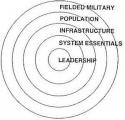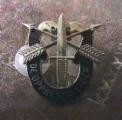Some interesting dialouge, not sure where it is going. Bob is once again trying to redefine everything, Slapout has presented an unorthodox theory, and Rank Amateur has redefined populace control.
Bob wrote,I think your trying to over simplify for clarity, and as I argued elsewhere when you oversimplify a problem you fail to adequately address the scope of the problem. Old Eagle already addressed part of the issue by pointing out the foreign intervention in support of insurgents, which you hand waved off as UW, but it is not that simple. In many cases there wouldn't even be an insurgency without outside intervention to mobilize a select target audience, then train and equip and advise them. I disagree with your argument that all insurgencies are internal (most may be, but not all). Second you state that one of the forms of insurgency is resistance against an invader. Following that logic, if the foreign invader has become the defacto government like we did in Iraq during the transition period, then we were conducting COIN against the insurgents.Insurgency and COIN are internal to any given state. No outsiders involved. The populace wages insurgency to change the politics, and there are three broad categories of insurgency: Resistence against a foreign invader, revolution to change the government of the entire state, and separatist to break a segment away (note, all three of these have been going on in Iraq, and all require unique solution sets). COIN is the efforts of the state to resolve these family disputes.
FID are the efforts of an outside third party to influence this state dynamic on the behalf of the current government. FID runs a tremendous scale, from routine exchanges with allies that have very stable governments, to full scale combat like we have been experiencing in places like Vietnam and Iraq.
Rank wrote,Rank, protecting the populace is a subset of populace and resource control (PRC), which is a wide range of activities designed to control the populace and designated resources to isolate the insurgents. PRC facilitates 3 objectives:I also believe there is huge confusion between "protecting the population" and "population control." You stop insurgencies by physically preventing the population from supporting insurgencies. The most effective way to do that is by building fences.
1. Isolate the insurgents from human and resource support.
2. Isolate the insurgent from the populace.
3. Identify and neutralize insurgent infrastructure.
Since many insurgents (if not most) use coercion to garner support from the populace, at least during the initial phases, then protecting the populace is key to severing the insurgent influence on the populace. I don't disagree with the requirement for fences, but is it feasible for the U.S. to advocate and support locking large groups of people up behind fences like the Brits did in Malaysia in 2008? How long do you think world opinion would allow us to continue now that path?
Slapout wrote,I don't get it? We declared war on Japan and Germany, and while the conventional war was the main effort we supported substantial unconventional operations, terrorist tactics, assassinations, fire bombings, and even the A-Bomb. In our war against insurgents we have actually been forced to follow more restrictions than we would in a declared war.We talked about this in detail a good while back. My position was that according to our form of government there are only two types of War. Declared and Undeclared! By it's very nature declared war is conventional...by declaring it we define it. Undeclared war by it's very nature is not well defined....hence the other side will break all the rules, because their aren't any.
Now this I like a lot:
Slapout can you send me the link to Tom's paper you referenced?Criminal organizations/Drug Dealers do this all the time and so do Terrorist Organizations and they can be very difficult to track and to attack because the cure can be worse than the disease. They use other peoples terrain but don't own it,they use other peoples money but not their own. We do not fight these organizations very well because of this. There is no COIN solution for them and Gian is right in that respect in that we should not go hog wild on COIN everything as opposed to creative use of more conventional forces.







 I know it's not Tom's paper but Tom posted it so I just call it that for short. Important paper and worth the read.
I know it's not Tom's paper but Tom posted it so I just call it that for short. Important paper and worth the read.
 ), but many of these organizations are interested in overthrowing the State government, but rather controlling some terrain (physical, human, cyber, etc.) within that State and others, so they can defy the State's laws and implement their own law of the land. It is an immature idea that I need to further develop, but by all means please tell me where you think I might be off track.
), but many of these organizations are interested in overthrowing the State government, but rather controlling some terrain (physical, human, cyber, etc.) within that State and others, so they can defy the State's laws and implement their own law of the land. It is an immature idea that I need to further develop, but by all means please tell me where you think I might be off track. 





Bookmarks